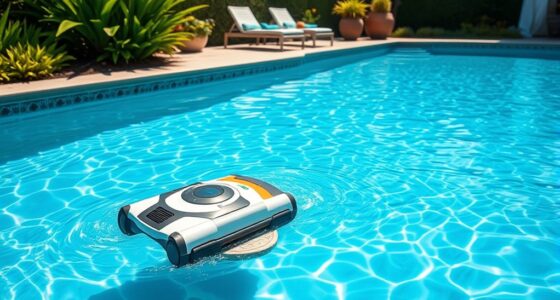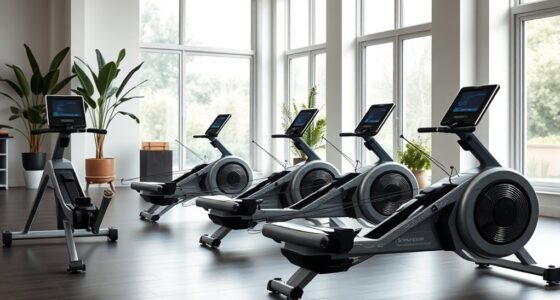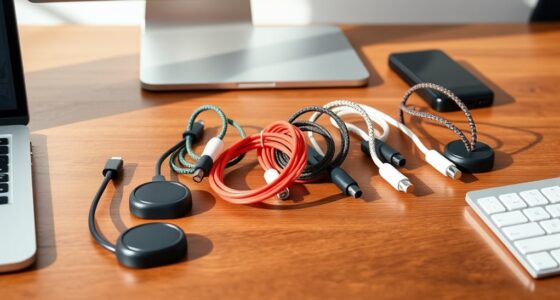If you’re looking for the best Arduino starter kits to kickstart your home projects, I’ve found top options like the KEYESTUDIO ESP32 Smart Home Kit, ELEGOO UNO Starter Kits, and official Arduino bundles. These kits come with high-quality components, detailed tutorials, and user-friendly assembly, perfect for DIY home automation and electronics projects. They support various programming environments and expandability, making them ideal for beginners and enthusiasts alike. Keep exploring, and you’ll discover which kit suits your needs best.
Key Takeaways
- Look for kits with genuine Arduino components, comprehensive tutorials, and organized packaging for easier home automation and electronics projects.
- Choose kits supporting popular programming environments like Arduino IDE, MicroPython, or Scratch for versatile learning.
- Prioritize kits with sensors, actuators, and modules compatible with WiFi, Bluetooth, or IoT to enhance home automation capabilities.
- Consider kits offering detailed step-by-step guides and online resources to ensure successful building and troubleshooting.
- Select options with a variety of components and project options suitable for beginners to advanced users building home smart systems.
KEYESTUDIO ESP32 Smart Home Starter Kit for Arduino and Python
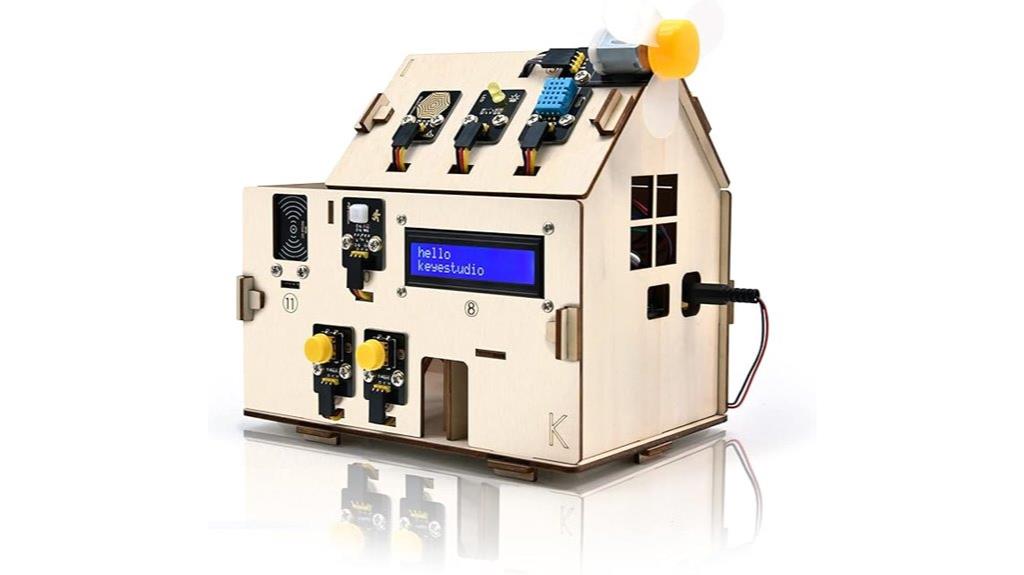
If you’re new to electronics and want a kit that combines home automation projects with straightforward programming, the KEYESTUDIO ESP32 Smart Home Starter Kit is an excellent choice. It’s perfect for beginners, teens, and adults enthusiastic to learn about electronics and smart home systems. The kit includes 13 projects that cover modules like sensors, buttons, LEDs, and more, helping you understand how smart homes work. You can program using C or MicroPython, with detailed tutorials to guide you through assembly and coding. It’s a hands-on way to explore automation, control devices via mobile, and develop practical skills in a fun, educational way.
Best For: beginners, teens, and adults interested in learning electronics, programming, and home automation through hands-on projects.
Pros:
- Includes 13 comprehensive projects with detailed tutorials for easy learning
- Supports both C and MicroPython programming languages for versatile coding practice
- Enables control of home appliances via mobile, fostering practical automation skills
Cons:
- Kit is unassembled and requires assembly and setup, which may be challenging for complete beginners
- Does not include batteries; users must supply 6 AA batteries separately
- Suitable for ages 15+; may be complex for very young children or complete novices
KEYESTUDIO Smart Home Starter Kit for Arduino

The KEYESTUDIO Smart Home Starter Kit for Arduino is an excellent choice for beginners, teens, and adults interested in exploring home automation through hands-on projects. It offers a thorough introduction to smart home technology, guiding users through 15 DIY projects that cover sensors, actuators, and control modules. The kit includes components for building a model smart house, with features like light control, presence detection, soil moisture monitoring, and gas leak alerts. With online tutorials and easy-to-follow instructions, it’s perfect for learning Arduino, electronics, and programming in a practical, engaging way. Plus, it makes a thoughtful gift for DIY enthusiasts and aspiring engineers.
Best For: beginners, teens, and adults interested in learning about home automation, electronics, and programming through hands-on DIY projects.
Pros:
- Includes comprehensive instructions and 15 DIY projects for practical learning
- Covers a wide range of sensors and actuators for versatile home automation applications
- Suitable for beginners with easy-to-follow tutorials and no prior experience needed
Cons:
- Requires a computer and mobile device for full functionality and remote control
- Powering the kit depends on 6 AA batteries, which may need frequent replacement
- Limited to Arduino Uno R3 compatibility, potentially restricting integration with other platforms
ELEGOO UNO Project Starter Kit with UNO R3 Board
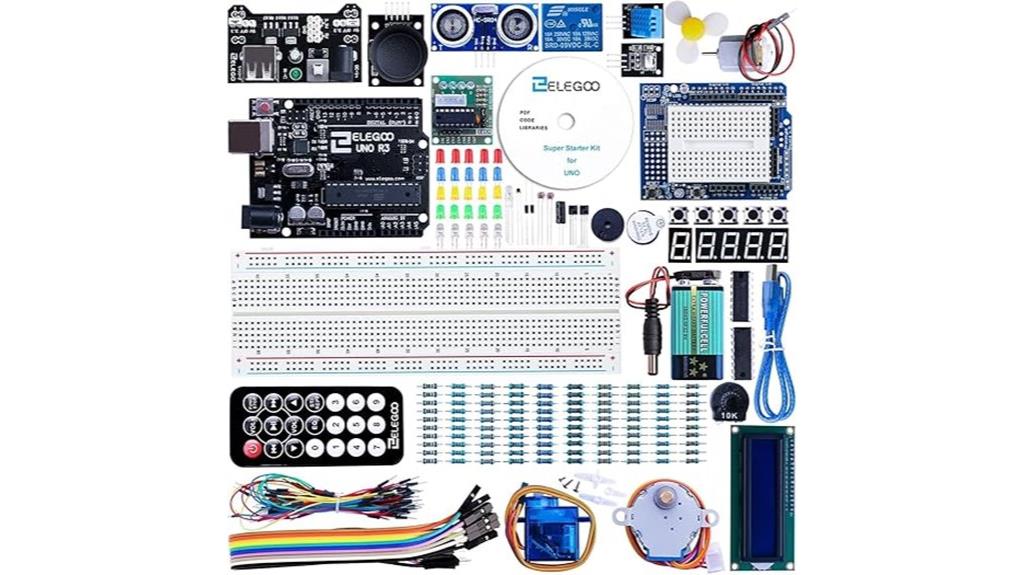
The ELEGOO UNO Project Starter Kit with UNO R3 Board stands out as a perfect choice for beginners enthusiastic to learn electronics and coding without the hassle of complex setups. It includes a compatible UNO R3, UNO R4, MEGA 2560 R3, and NANO boards, along with a detailed PDF tutorial covering over 22 lessons. The kit offers high-quality, open-source clones that perform reliably, with organized components like LCD displays, sensors, LEDs, motors, and more. Easy-to-follow instructions and well-labeled parts make setup straightforward. Overall, it’s an economical, versatile kit that provides a solid foundation for exploring electronics and coding projects.
Best For: beginners and hobbyists seeking an all-in-one, easy-to-use electronics and programming starter kit for learning and experimenting with Arduino-based projects.
Pros:
- Includes a variety of high-quality, compatible Arduino boards and components suitable for multiple project types
- Comes with comprehensive tutorials and organized packaging, making setup and learning straightforward
- Offers durable, open-source clones that perform reliably and support ongoing experimentation
Cons:
- Limited software explanations may require additional online resources for troubleshooting
- Small packaging size might be restrictive for very extensive or complex projects
- Some minor parts may be missing or require replacement over time with heavy use
Arduino Official Starter Kit Deluxe Bundle with Make: Getting Started Book
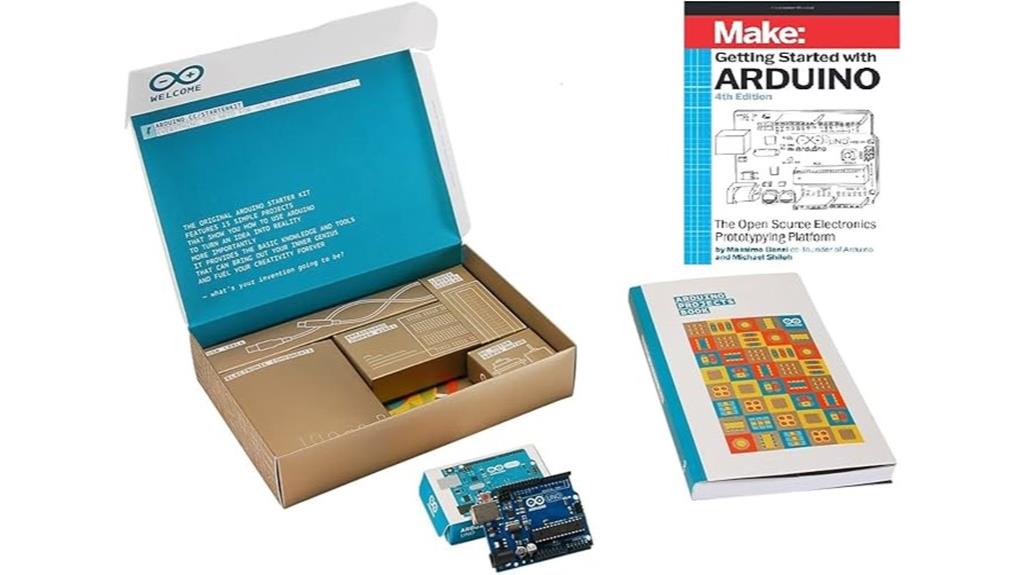
Designed for beginners and educators alike, the Arduino Official Starter Kit Deluxe Bundle with Make: Getting Started Book offers an all-inclusive introduction to electronics and programming. It includes the Arduino Uno, sensors, motors, LEDs, an LCD display, and various modules, all tested for quality and compatibility. The kit features step-by-step guides, making it easy to learn coding, electronics, and robotics through practical projects. Suitable for all skill levels, it encourages creativity and problem-solving while supporting both educational and personal projects. Whether you’re new to Arduino or expanding your skills, this extensive bundle is an excellent way to start building exciting IoT and automation projects.
Best For: beginners, educators, hobbyists, students, and makers seeking a comprehensive and user-friendly introduction to electronics, coding, and robotics.
Pros:
- Includes a wide variety of high-quality components tested for full compatibility with Arduino IDE
- Comes with detailed step-by-step guides suitable for all skill levels, from beginners to advanced users
- Supports a broad range of projects including IoT, automation, robotics, and STEM learning
Cons:
- Might be overwhelming for absolute complete beginners due to the number of components and potential complexity
- The extensive kit can be relatively expensive compared to basic starter sets
- Requires some prior interest or basic understanding of electronics to maximize learning and project development
ELEGOO UNO R3 Starter Kit with 200+ Components
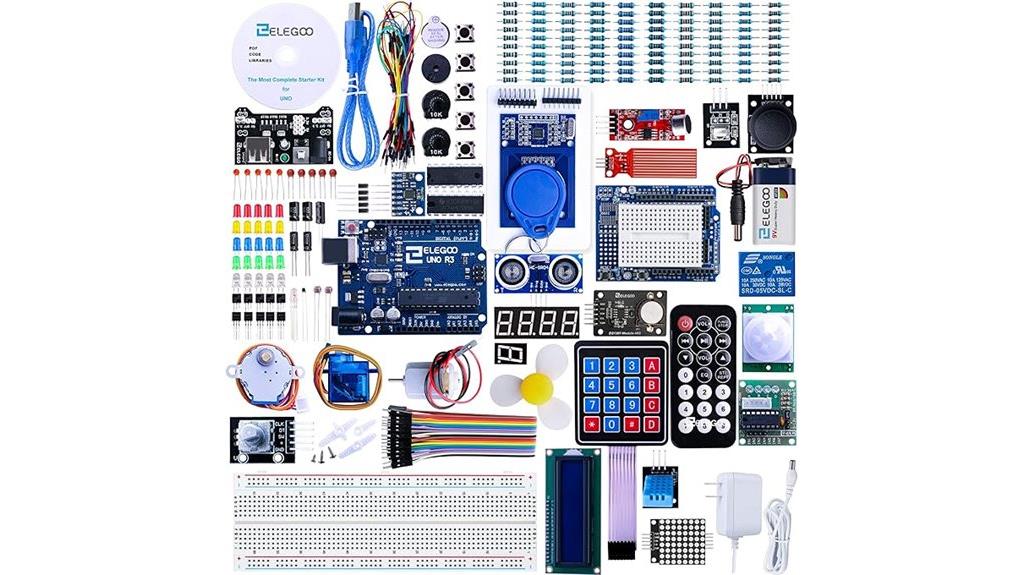
If you’re looking for a detailed starter kit that makes learning Arduino accessible, the ELEGOO UNO R3 Starter Kit with over 200 components stands out as an excellent choice. It includes a wide variety of modules, with 63 types of Arduino-compatible parts, all pre-soldered for easy wiring. The kit features the UNO R3 controller, a USB cable, and detailed tutorials with over 30 lessons, plus all code on a handy CD. Packaged in an organized case with bonus storage for small parts, it offers great value. Whether you’re a beginner or experienced maker, this comprehensive kit simplifies setup and helps you dive straight into project building.
Best For: beginners and experienced makers seeking a comprehensive, organized Arduino starter kit with extensive components and tutorials to facilitate learning and project development.
Pros:
- Includes over 200 components and 63 types of Arduino-compatible modules for versatile project options
- Comes with detailed PDF tutorials and all code on a CD, making learning straightforward
- Pre-soldered modules and organized packaging enhance ease of setup and storage
Cons:
- The large number of components may be overwhelming for absolute beginners without prior guidance
- Some advanced users might find the included tutorials basic or limited in scope
- The kit’s extensive content could lead to higher upfront cost compared to simpler starter kits
Official Arduino Starter Kit with 12 DIY Projects and Electronics Components
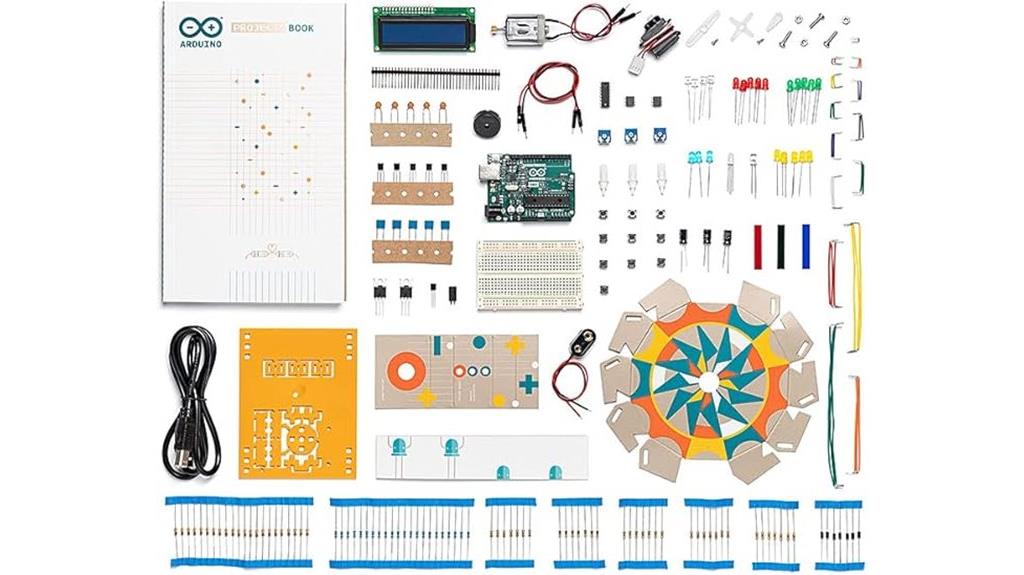
For beginners and educators seeking a reliable, all-in-one starter kit, the Official Arduino Starter Kit with 12 DIY projects offers a thorough introduction to electronics and programming. It includes genuine Arduino components, detailed instructions, and a detailed manual that guides you through progressively challenging projects. The kit features high-quality parts like microcontrollers, LEDs, transistors, and breadboards, all neatly organized in attractive packaging. Designed for all skill levels, it provides hands-on experience that builds foundational STEM concepts. With excellent user reviews, reliable performance, and support for multiple operating systems, this kit is a versatile and valuable tool for learning and creating.
Best For: beginners, educators, and hobbyists seeking a comprehensive, reliable starter kit to learn electronics and programming with high-quality components.
Pros:
- Includes genuine Arduino components and detailed step-by-step instructions for all skill levels
- Organized, attractive packaging enhances the unboxing and setup experience
- Offers hands-on projects that build foundational STEM skills and foster creativity
Cons:
- Some users find sourcing individual components cheaper than buying the kit
- Minor packaging damage has been reported but does not affect functionality
- The price may be higher compared to assembling similar components separately
ELEGOO Mega R3 Arduino Starter Kit
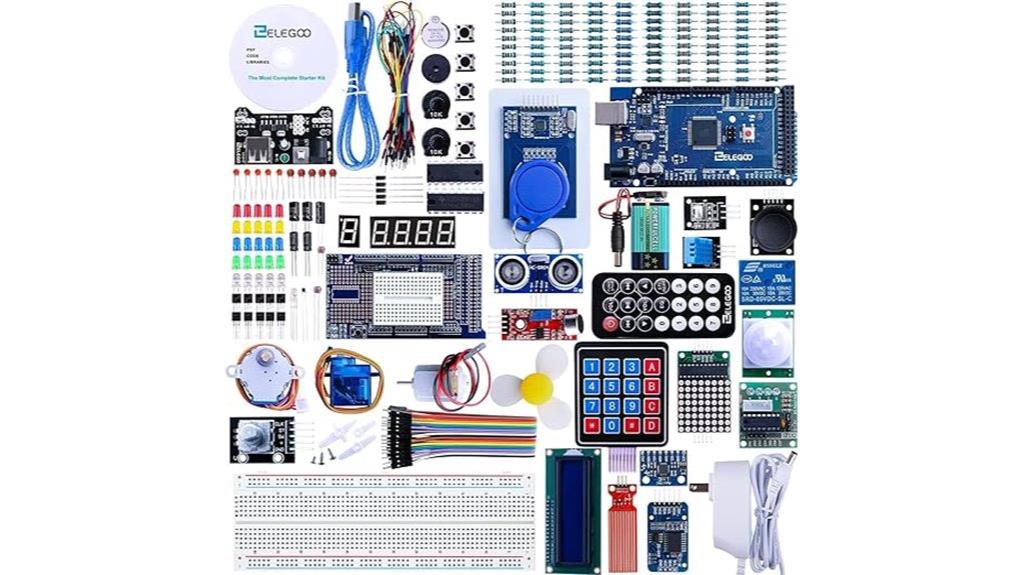
The ELEGOO Mega R3 Arduino Starter Kit stands out as an excellent choice for beginners and hobbyists seeking an all-encompassing electronics project experience. It includes the powerful Mega2560 board and over 200 high-quality components, such as LCD modules, sensors, LEDs, buttons, and diodes, all stored in an organized box. The kit also offers a detailed PDF tutorial with 35 lessons, guiding users through diverse projects. Presented in a clear package, it emphasizes user convenience and quality. ELEGOO’s focus on customer satisfaction makes this kit perfect for learning, experimenting, and bringing your home projects to life.
Best For: beginners and hobbyists looking for a comprehensive electronics starter kit with detailed tutorials and high-quality components.
Pros:
- Includes a powerful Mega2560 board compatible with Arduino IDE for easy programming
- Over 200 components such as LCD modules, sensors, LEDs, and buttons for diverse projects
- Comes with a well-organized storage box and a detailed PDF tutorial with 35 lessons
Cons:
- Some components may require basic soldering or assembly skills for certain projects
- The extensive component list can be overwhelming for absolute beginners
- The kit’s size and variety might be more than needed for simple projects, potentially leading to clutter
SunFounder Elite Explorer Kit with Arduino Uno R4 WiFi and IoT Components
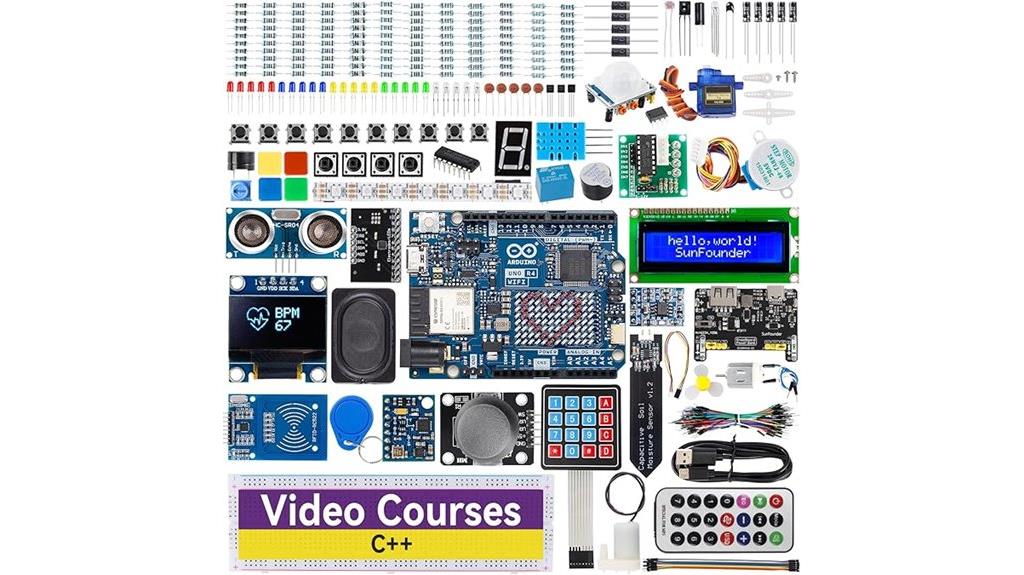
The SunFounder Elite Explorer Kit with Arduino Uno R4 WiFi and IoT Components stands out as an ideal choice for beginners eager to plunge into IoT and smart device projects. It includes a genuine Arduino Uno R4 WiFi board, over 300 high-quality parts, sensors, LEDs, motors, displays, and a rechargeable battery. With more than 50 projects—ranging from basic circuits to IoT applications—it’s perfect for learners aged 8 and up. The kit offers detailed tutorials, open-source code, and compatibility with Arduino Uno R3 and Nano, enabling extensive customization. Powered by the advanced R4 WiFi, it’s great for hands-on STEM education, hobbyist experimentation, and developing real-world smart devices.
Best For: beginners and hobbyists interested in exploring IoT, robotics, and electronics with a comprehensive Arduino starter kit.
Pros:
- Includes a genuine Arduino Uno R4 WiFi with advanced features like built-in WiFi and Bluetooth.
- Over 300 high-quality components and detailed tutorials support extensive learning and project customization.
- Suitable for all skill levels, from beginners aged 8+ to experienced educators and engineers.
Cons:
- Lacks a dedicated storage case, making organization difficult over time.
- Some jumper wires are fragile and may disconnect easily.
- Mismatched wire gauge and breadboard slots can cause loose connections during experimentation.
ELEGOO UNO R3 Robot Car Kit V4 for Arduino STEM Kids 8-16
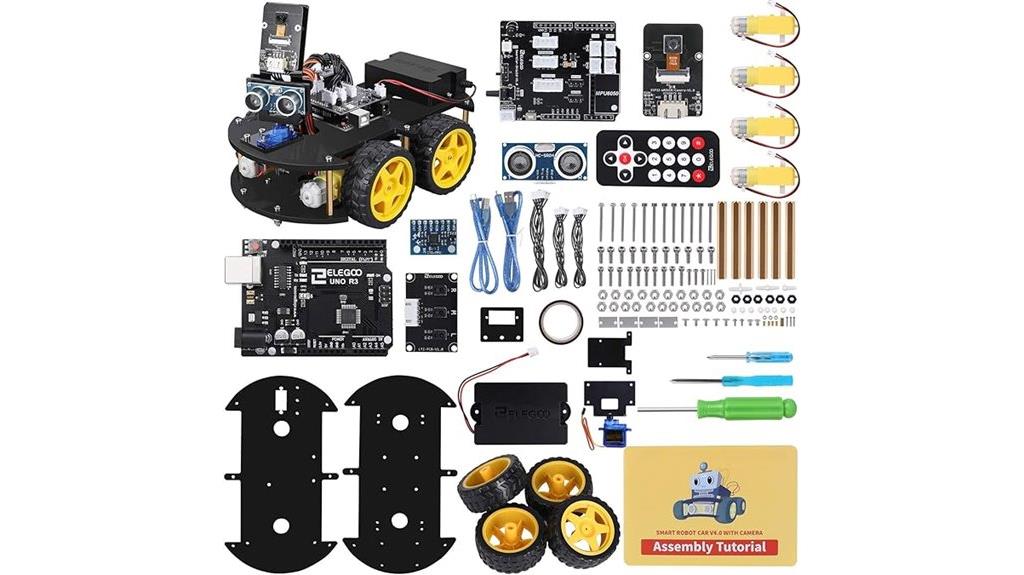
If you’re looking for an engaging robotics starter kit suitable for kids aged 8 to 16, the ELEGOO UNO R3 Robot Car Kit V4 stands out as an excellent choice. It offers hands-on experience in programming, electronics, and robotics with 24 modules like obstacle avoidance, line tracing, infrared remote, and WiFi control via smartphones. The kit is easy to assemble thanks to simplified connections and detailed tutorials. It includes a pre-programmed UNO R3 controller, sensors, and a camera, making it perfect for classroom or home projects. While some features require adjustments, users find it fun, educational, and capable of inspiring creativity in young learners.
Best For: beginner kids aged 8-16 interested in learning robotics, programming, and electronics through hands-on projects.
Pros:
- Easy to assemble with simplified connections and detailed tutorials.
- Includes a variety of modules such as obstacle avoidance, line tracing, and WiFi control.
- Promotes creativity, problem-solving, and STEM learning in both classroom and home settings.
Cons:
- Some features, like line following and WiFi, may require adjustments and troubleshooting.
- Complex code and hardware integration can be challenging for absolute beginners.
- Limited remote control range and sensor sensitivity issues may affect performance.
SunFounder ESP32 Starter Kit for IoT and Arduino Projects

Looking for an all-in-one IoT starter kit that caters to both beginners and advanced users? The SunFounder ESP32 Starter Kit is perfect. It offers over 50 video tutorials covering everything from basic setup to complex projects like home automation and Bluetooth control. The kit includes a powerful ESP32-WROOM-32E board, a camera extension for real-time video streaming, and battery support for portability. Supporting C++, MicroPython, and Scratch, it suits various skill levels. Plus, it provides extensive tutorials, an active community, and technical support, making IoT development accessible, engaging, and fun for everyone.
Best For: hobbyists, students, and professionals seeking a versatile and comprehensive IoT starter kit for learning, experimentation, and complex project development.
Pros:
- Offers over 50 detailed video tutorials suitable for all skill levels
- Features a powerful ESP32-WROOM-32E board with camera extension and battery support for versatile applications
- Supports multiple programming languages including C++, MicroPython, and Scratch to accommodate different learning preferences
Cons:
- The extensive content may be overwhelming for absolute beginners without prior experience
- Some users might find the setup process complex due to the variety of components and features
- Limited hardware customization options beyond the included accessories
SunFounder Ultimate Starter Kit for Arduino UNO
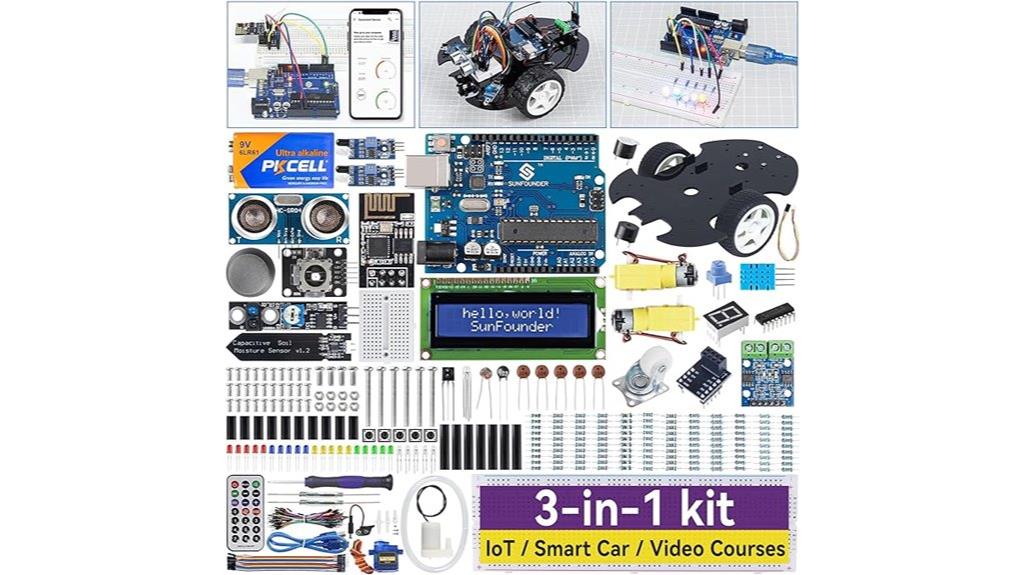
For beginners enthusiastic to explore electronics and programming, the SunFounder Ultimate Starter Kit for Arduino UNO stands out as an excellent choice. It includes 192 items and 87 projects, making it perfect for hands-on learning. The kit features high-quality sensors, actuators, power supplies, and an Arduino-compatible Uno board, enabling a wide range of projects from simple LEDs to advanced IoT and robot cars. With online tutorials and video courses designed in partnership with Circuit Basics, I can progress from basic to complex skills confidently. Plus, the community support and technical assistance make sure I stay motivated and troubleshoot effectively as I bring my ideas to life.
Best For: beginners and young enthusiasts aged 8+ eager to learn electronics, programming, and robotics through hands-on projects and online tutorials.
Pros:
- Comprehensive kit with 192 items and 87 projects suitable for a wide range of skill levels
- Includes high-quality sensors, actuators, and an Arduino-compatible Uno board for versatile applications
- Online tutorials and video courses in partnership with Circuit Basics support progressive learning
Cons:
- Might be overwhelming for absolute complete beginners due to the large number of components and projects
- Requires a computer with Arduino IDE installed, which may pose a learning curve for new users
- Some advanced projects may need additional components not included in the kit
LAFVIN Arduino Project Starter Kit (R3 Mega2560 Mega328 Nano)
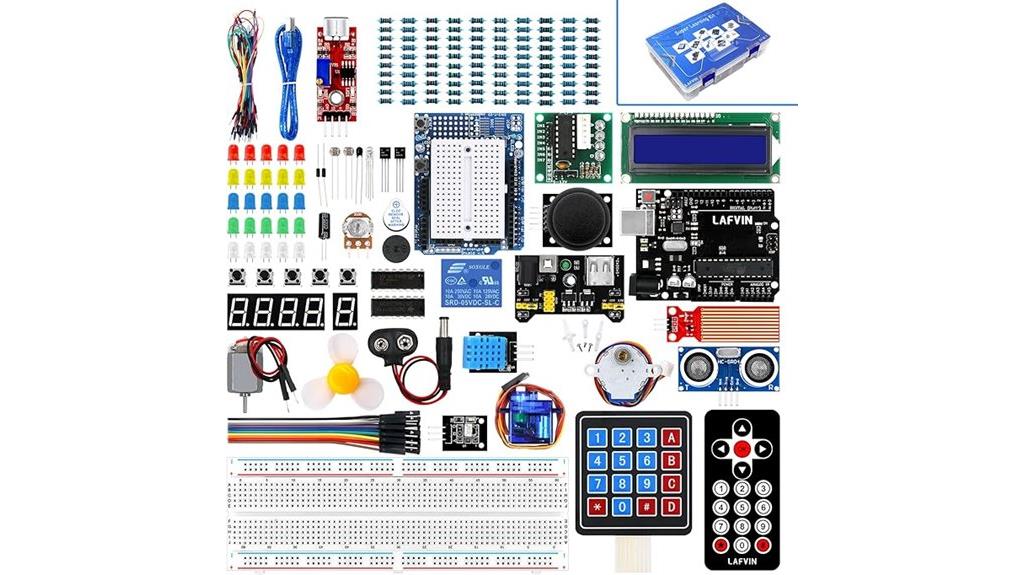
The LAFVIN Arduino Project Starter Kit stands out as an excellent choice for beginners enthusiastic to learn electronics and programming, thanks to its extensive set of components and detailed educational resources. It’s compatible with R3 Mega2560, Mega328, and Nano Arduino boards, making it versatile for various projects. The kit includes over 20 lessons, code examples, datasheets, and all-encompassing guidance, simplifying the learning process. It features essential components like servo motors, stepper motors, LCD modules, and more, all supporting Arduino IDE programming. The LCD 1602 display comes with pin headers, eliminating soldering, which makes starting electronics projects straightforward and enjoyable.
Best For: beginners and students eager to learn electronics and programming with a comprehensive starter kit compatible with multiple Arduino boards.
Pros:
- Includes extensive educational resources with over 20 lessons, code examples, and datasheets for easy learning.
- Compatible with R3 Mega2560, Mega328, and Nano Arduino boards, offering versatile project options.
- Contains a wide variety of components such as motors, LCD modules, and electronic parts, facilitating diverse project creation.
Cons:
- May be overwhelming for complete beginners due to the variety of components included.
- Some users might find the included tutorials too basic if they already have foundational knowledge.
- The size of the kit could be bulky for storage or transport, especially with all components included.
ELEGOO UNO Starter Kit with Tutorial and Arduino IDE Compatibility
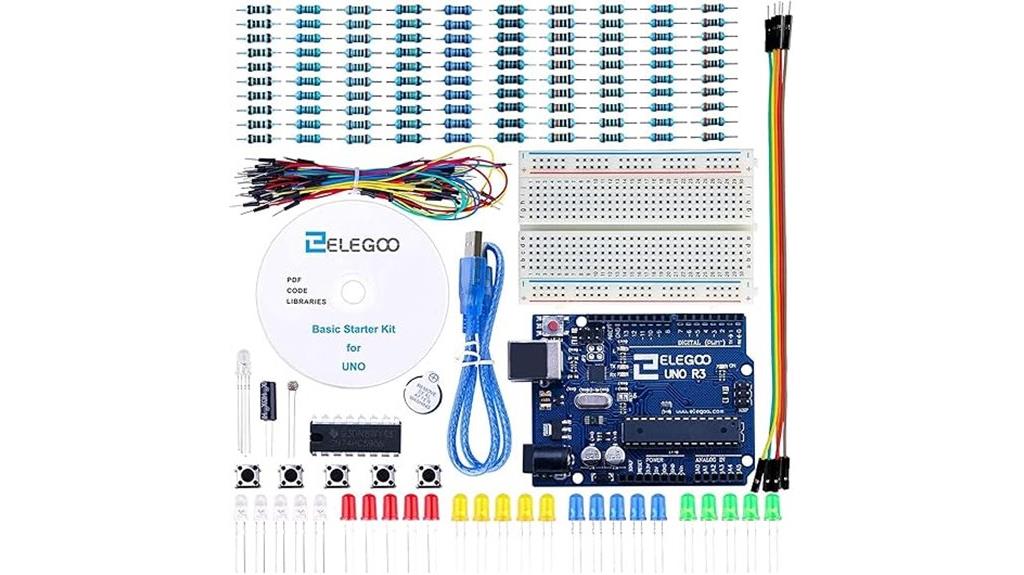
If you’re just starting out with Arduino, the ELEGOO UNO Starter Kit is an excellent choice because it offers all the essential components you need to learn the basics without breaking the bank. It includes the latest UNO R3 board, compatible with Arduino IDE, along with a USB cable and a variety of basic electronic parts. The kit also features an extensive PDF tutorial with project ideas and code examples, making it easier to learn without hunting for instructions. Packaged neatly in a well-organized box, it’s perfect for beginners seeking an affordable, user-friendly way to explore electronics and programming.
Best For: beginners and hobbyists looking for an affordable, comprehensive starter kit to learn Arduino electronics and programming.
Pros:
- Compatible with Arduino IDE and multiple Arduino models, offering versatility
- Comes with a detailed PDF tutorial and project ideas to facilitate learning
- Well-organized packaging with all essential components included for easy setup
Cons:
- Basic components may limit advanced project development
- Lacks some specialized modules found in higher-end kits
- May require additional tools or components for more complex projects
Factors to Consider When Choosing Arduino Starter Kits for Home Projects
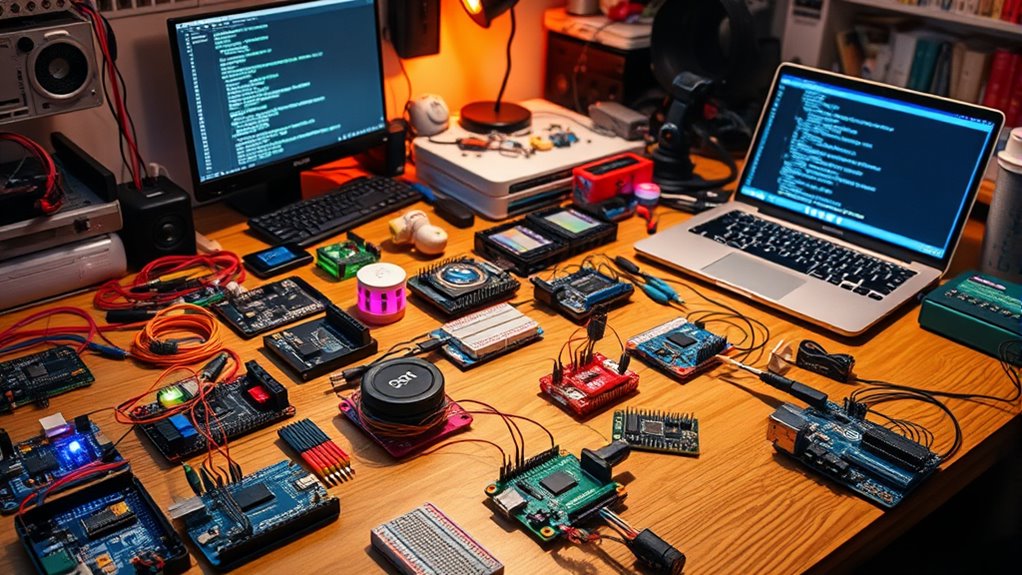
When selecting an Arduino starter kit for your home projects, I focus on compatibility with my devices and the variety of projects it supports. I also check the quality of components and whether the kit offers solid educational resources to help me learn. Considering these factors guarantees I get a kit that’s both versatile and reliable for my needs.
Compatibility With Devices
Choosing an Arduino starter kit that’s compatible with your existing devices is essential for smooth integration into your home automation projects. I recommend checking if the kit supports sensors, actuators, and peripherals you already have or plan to use. It’s also important to see if the kit supports multiple communication protocols like WiFi, Bluetooth, or Zigbee, to connect with various smart home devices. Verify that the microcontroller or development board matches your preferred programming environment, whether Arduino IDE or MicroPython. Additionally, ensure the modules and sensors operate within common voltage and power requirements to avoid hardware issues. Ultimately, look for kits that support expandability with extra modules or shields, so your system can grow and adapt as your home automation needs evolve.
Project Variety Offered
A wide variety of projects in an Arduino starter kit can substantially enhance your home automation experience. With diverse projects, you can explore everything from lighting control to environmental monitoring, giving you a well-rounded understanding of smart home systems. The number of included projects reflects the kit’s versatility, providing opportunities for experimentation, customization, and tackling more advanced automation tasks. A broad selection also supports incremental learning—starting with simple setups and gradually progressing to complex automation solutions. Plus, many kits include step-by-step tutorials, making it easier for beginners to replicate and adapt projects to their specific needs. Overall, choosing a kit with a wide range of projects ensures you stay engaged and learn effectively as you build your home automation skills.
Component Quality Assurance
High-quality components are vital for guaranteeing the durability and reliable performance of your home automation projects. I always look for kits where parts are manufactured with high-grade materials, which helps prevent failures over time. It’s essential to verify that sensors, modules, and electronic parts come from reputable suppliers with certifications or safety standards, giving me confidence in their reliability. I also check detailed specifications and datasheets to ensure compatibility with my projects. Additionally, I prefer kits that offer warranties or guarantees, as they provide peace of mind against defects. Reading positive user reviews is invaluable, especially feedback about how well components hold up in real-world home automation setups. Prioritizing quality ensures my projects are both long-lasting and dependable.
Programming Language Support
Many Arduino starter kits support multiple programming languages, giving users the flexibility to select the best fit for their skills and project goals. C++ is the most common language, compatible with the Arduino IDE and backed by extensive libraries and community support, making it ideal for more advanced projects. MicroPython offers a simpler syntax, which is perfect for beginners and rapid prototyping, especially on boards like ESP32 and ESP8266. Some kits also include tutorials and examples tailored to specific languages, helping users learn faster and build confidence. The choice of programming language can affect project complexity—C++ provides more power and customization, while MicroPython offers a more accessible entry point. Considering your skill level and project needs will help you select the best kit for your home projects.
Educational Resources Provided
Have you ever started a project only to find yourself stuck because the instructions or resources were unclear? That’s why I prioritize educational resources when choosing an Arduino starter kit. High-quality tutorials, detailed step-by-step guides, circuit diagrams, and code examples make a huge difference in understanding and completing projects successfully. All-encompassing kits often include these materials, helping beginners grasp concepts quickly and confidently. Access to online tutorials, videos, and community forums is also invaluable for troubleshooting and expanding skills. Well-structured educational resources guide you from simple ideas to more complex home automation projects, ensuring steady progress. In my experience, the better the tutorials and documentation, the higher my satisfaction and the more successful my projects turn out.
Ease of Assembly
Choosing an Arduino starter kit that’s easy to assemble can make a big difference, especially if you’re new to electronics. Clear instructions, labeled components, and step-by-step guides help you understand the process without frustration. Kits with pre-soldered modules and plug-and-play connections save time and reduce the need for technical skills. Visual aids and all-encompassing tutorials walk you through each project, making the learning curve smoother. Well-organized packaging with categorized parts allows for quick setup and efficient assembly. Additionally, compatibility with standard connectors and wiring practices minimizes confusion and simplifies connections. Overall, a kit designed for straightforward assembly boosts confidence, speeds up your projects, and keeps the focus on building and learning rather than troubleshooting.
Budget and Cost
When selecting an Arduino starter kit for your home projects, setting a clear budget helps you find options that offer good value without overspending. Start by determining your price range to focus on affordable kits that meet your needs. Keep in mind that additional components or accessories might be necessary, so factor in those potential costs. It’s helpful to compare the price-to-value ratio by evaluating the quality and quantity of components relative to the overall price. Watch out for hidden expenses like tools, power supplies, or programming software, which can increase your investment. Aim for a kit that balances affordability with essential features, ensuring you get everything needed for your home automation projects without breaking the bank.
Expansion Potential
Since your home automation projects may grow more complex over time, it’s important to select an Arduino starter kit that offers strong expansion options. Look for kits with a variety of modules and sensors, so you’re prepared for future project complexity. Compatibility is key—guarantee the hardware can support additional shields, modules, or custom components to upgrade your system easily. Check if the software environment and libraries can handle new features or integrations as your projects evolve. Supporting multiple communication protocols like WiFi, Bluetooth, or Zigbee expands connectivity possibilities. Finally, choose a kit with detailed documentation and active community support, which makes troubleshooting and adding new functionalities much smoother. These factors help ensure your starter kit can grow with your automation ambitions.
Frequently Asked Questions
Which Arduino Starter Kit Offers the Most Comprehensive Iot Components?
You’re wondering which Arduino starter kit has the most complete IoT components. I’ve found that the Arduino starter kits with Wi-Fi and Bluetooth modules are ideal for IoT projects. The Arduino Starter Kit with the MKR WiFi 1010 or the Arduino Uno WiFi Rev2 offers extensive IoT features, including sensors, connectivity options, and easy-to-use interfaces. These kits help you build connected devices effortlessly and expand your IoT projects.
Are There Kits Suitable for Advanced Robotics Projects?
You’re asking if there are kits suitable for advanced robotics projects. I’ve found that some Arduino kits come with powerful motors, sensors, and microcontrollers ideal for complex robotics. These kits often include components like motor shields, servos, and ultrasonic sensors. I recommend looking for ones tailored for robotics, so you get everything needed to build and program advanced robots. Trust me, these kits make ambitious projects much more manageable!
Can These Kits Be Used for Educational Purposes for Kids?
Did you know that over 60% of kids learn best through hands-on activities? I believe these kits are perfect for educational purposes because they’re simple to use and engaging. I’ve seen children develop amazing skills while building projects, which makes learning fun and interactive. So, yes, these kits are fantastic tools for teaching kids about electronics and coding, sparking their curiosity and creativity from an early age.
Do Any Kits Include Wireless Communication Modules?
You’re curious if any kits include wireless communication modules. I’ve found that many starter kits do come with Bluetooth, Wi-Fi, or RF modules, making it easy to add wireless features to your projects. These modules are great for creating remote-controlled devices or IoT projects. When choosing a kit, check the included components to guarantee it has the wireless communication options you need to bring your ideas to life effortlessly.
Which Kits Are Compatible With Third-Party Sensors and Modules?
Imagine a toolkit bursting with possibilities—many Arduino kits are compatible with third-party sensors and modules. I’ve found that open-source kits like the Arduino Uno and Mega are especially flexible, allowing you to easily add sensors, wireless modules, and custom components. They often come with ample pins and support community-made libraries, making it simple to expand your projects without restrictions. So, if versatility is your goal, these kits are a perfect fit.
Conclusion
Choosing the right Arduino starter kit can turn your home project ideas into reality. For example, I once built a smart lighting system using the ELEGOO UNO Starter Kit, and it transformed my space. Whether you’re a beginner or looking to expand your skills, selecting a kit that matches your goals makes all the difference. Jump in, experiment, and soon you’ll see your home automation dreams come to life with confidence.


